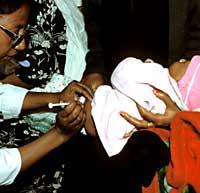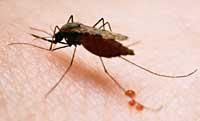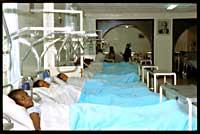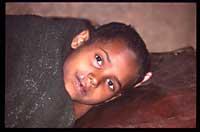Unsurpassed malaria?

Researchers are very hopeful. For the first time in the history of malaria, a vaccine has been quite successful in clinical trials. In addition, this vaccine seems especially effective in the most serious cases of malaria, that is, in children and in the hardest variant of the disease.
Between one million and four million people die each year from malaria. The largest number of malaria cases occur in Africa, where children die mostly. Therefore, clinical sessions to test this vaccine have been conducted in a hospital in Mozambique.
Clinical sessions are necessary to know the effectiveness of the vaccine. And they are especially important in the case of malaria, since it is a disease caused by a parasite or human parasite and has not been tested with animals before testing it with man. Well, the effectiveness of this vaccine has been proven with about two children between one and four years.
However, they have not been the first tests with humans. This vaccine was first tested in adults, and it seems that in children it has influenced better than in adults. In fact, in the tests carried out at this hospital in Mozambique the results have been very satisfactory: the vaccine has reduced by 78% the risk of developing disease in certain circumstances.
Good results

With this vaccine, children become infected exactly the same, but it does not help to get sick. Only 688 children received complete treatment of the vaccine, three doses, and the risk of getting sick was reduced by 30%. According to the researchers, in the case of the most serious variant of malaria the risk was further reduced: 58%.
Moreover, the results that have awakened the most expectations have been achieved with very young children. The risk of serious malaria disease in children aged 1 to 2 years has decreased by 76%. ‘The best results obtained so far with a malaria vaccine are by far,’ according to Pedro Alonso. Pedro Alonso is a researcher at the University of Barcelona and has directed the clinical trials of this vaccine.
The vaccine has been developed and tested by a broad art group. The clinical tests of the hospital have been performed by a working team of the University of Barcelona, but the vaccine has been produced by a Belgian company, GSK Biologicals. When creating this vaccine, the main objective was to help the immune system to kill the malaria parasite (Plasmodium).
This parasite spreads through the Anopheles mosquito. When a female carabiner punctures someone, Plasmodium passes from the mosquito's body to the blood of the puncture. Or, conversely, if someone infected with malaria is pinched, the mosquito can collect the parasite and contaminate the cuitado that it paints below.

When the parasite enters a person's blood, it reaches the liver and begins to reproduce. It is then that you can say that the person is sick, since increasing the parasite begins the attack of the immune system. The patient has high fever, headache, and vomiting. Meanwhile, the parasite works by destroying red blood cells.
To combat this parasite, the vaccine has two main components. One of these components causes the response of the immune system to occur as soon as possible and with the other T cells, special cells of the immune system are strengthened.
Early morning to ring the bell
The first steps to getting this vaccine were in 1986. Almost twenty years have passed since then; malaria research is slow, as you can see. And it still cannot be said that the malaria vaccine has been obtained, since before reaching the market tests must be carried out in other territories. The efficacy and safety of the vaccine should be checked. And even if everything goes well, it will not be marketed from here to five or six years.

Therefore, you still can not touch the bell. The day the malaria vaccine will be distributed in hospitals in Africa, South Asia and South America is still far away. The biggest obstacle is the lack of money. Because whoever makes that vaccine will not get rich: it will have a wide market, but very poor. In the case of this vaccine they have recently tested, for example, Bill Gates and his wife have funded all the research.
However, and while it may seem surprising, with or without vaccine, there is a cheaper way to fight malaria: use the mosquito net overnight to sleep. In some areas you can collect more than one hundred mosquitoes in a room, so it is difficult to wake up in the morning without biting at night. With this network there is also a bite, but at least the fewer punctures we receive, the lower the risk of contracting malaria.
As you can see, at the moment you can not do much more. The vaccine is still far away if it ever arrives.
Published in 7K.
Buletina
Bidali zure helbide elektronikoa eta jaso asteroko buletina zure sarrera-ontzian











